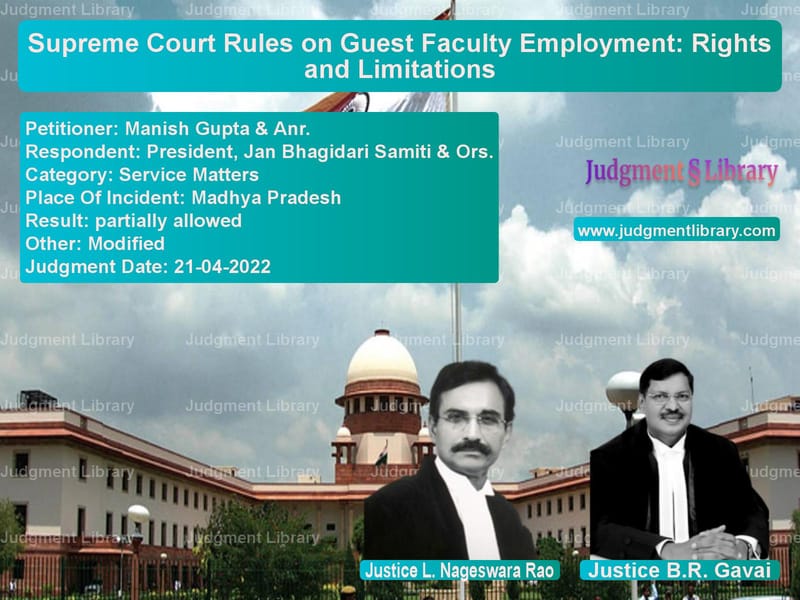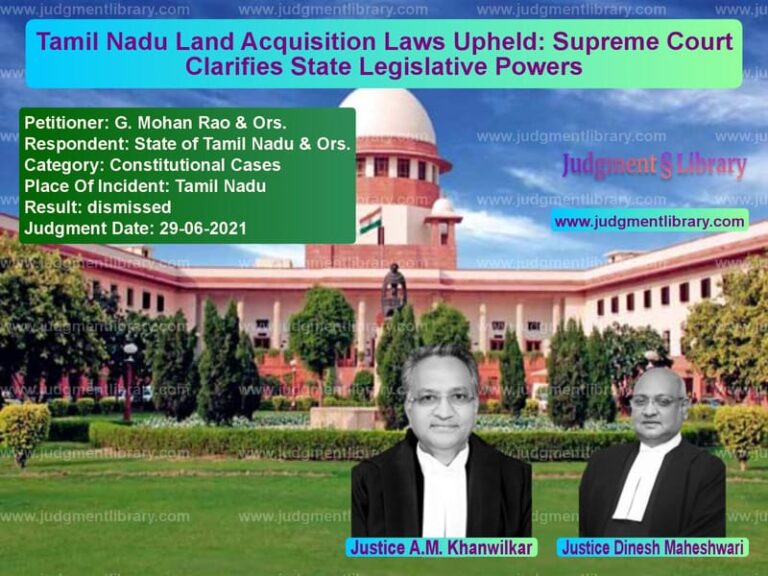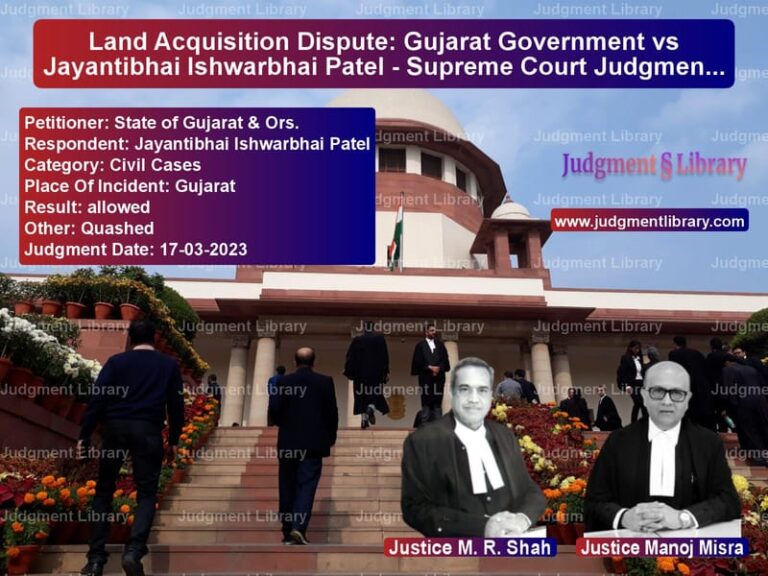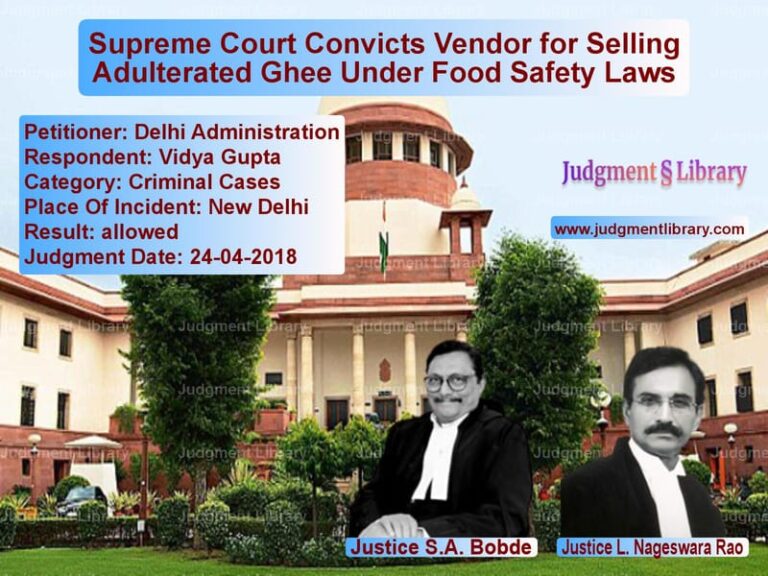Supreme Court Rules on Guest Faculty Employment: Rights and Limitations
The case of Manish Gupta & Anr. vs. President, Jan Bhagidari Samiti & Ors. revolved around the employment rights of guest faculty teachers in government colleges under the Jan Bhagidari Scheme of Madhya Pradesh. The Supreme Court had to determine whether guest faculty teachers, who were engaged on a contractual basis, had the right to continued employment and the appropriate remuneration structure.
Background of the Case
The Government of Madhya Pradesh introduced the Jan Bhagidari Scheme through a notification on September 30, 1996. The scheme aimed to involve local communities in the administration of government colleges. Under this initiative, committees known as Jan Bhagidari Samitis were formed to manage colleges, comprising local representatives such as members of legislative bodies, district collectors, and representatives from various community groups.
Key developments in the case:
- 2001: The Madhya Pradesh government introduced self-financing courses in government colleges, allowing Jan Bhagidari Samitis to manage these courses.
- 2014: Advertisements were issued for guest faculty appointments in various government colleges for the academic year 2014-2015.
- 2015: After completing one academic session, the guest faculty members were discontinued, and fresh advertisements were issued for new recruitments.
- 2016: Aggrieved by their discontinuation, the guest faculty members filed a writ petition before the Madhya Pradesh High Court.
The Single Judge of the High Court ruled in favor of the guest faculty members, directing that they be allowed to continue working until regular appointments were made and receive salaries per the University Grants Commission (UGC) norms. However, this decision was overturned by the Division Bench on February 8, 2017, leading the guest faculty members to appeal before the Supreme Court.
Read also: https://judgmentlibrary.com/supreme-court-rules-on-territorial-jurisdiction-in-labour-disputes/
Petitioners’ Arguments
Senior Advocate Rana Mukherjee, representing the guest faculty members, contended:
“The government’s practice of terminating guest faculty members at the end of every academic session and reappointing new individuals for the next session is unfair and arbitrary. This cycle deprives qualified teachers of stable employment despite continued teaching demand.”
Key points raised:
- The guest faculty members were duly qualified and selected through a proper process.
- The government had an obligation to regularize their employment since their services were required every year.
- The frequent termination and reappointment of faculty members violated natural justice and employment laws.
- The High Court’s Division Bench erred in overturning the Single Judge’s ruling, which had rightly protected the teachers’ rights.
Respondents’ Arguments
Additional Solicitor General K.M. Nataraj, appearing for the state, defended the employment policy and countered:
“The guest faculty members were never appointed on a permanent basis. Their engagement was purely contractual, for 11-month terms, and subject to student enrollment numbers.”
Key arguments:
- The Jan Bhagidari Samitis were self-financing entities that relied on student tuition fees to pay faculty salaries.
- The employment of guest faculty was based on annual needs, and there was no commitment to permanent employment.
- The teachers were hired at an honorarium rate determined by the committees, not per UGC pay scales.
- Since the faculty members had accepted their terms of employment voluntarily, they could not later demand permanent status or higher pay.
Supreme Court’s Observations
The Supreme Court bench, comprising Justices L. Nageswara Rao and B.R. Gavai, ruled partially in favor of the guest faculty members. The Court acknowledged their right to continued employment under specific conditions but rejected their demand for UGC-scale salaries.
The Court stated:
“An ad hoc employee cannot be replaced by another ad hoc employee. They can only be replaced by regularly selected candidates through a prescribed selection process.”
The Court cited its previous judgments, including:
- Rattan Lal vs. State of Haryana (1985) 4 SCC 43: Holding that ad hoc employees should not be arbitrarily replaced.
- Hargurpratap Singh vs. State of Punjab (2007) 13 SCC 292: Establishing that temporary employees can continue working until permanent selections are made.
The Court ruled:
- The guest faculty members must be retained until regular appointments are made.
- Their continuation is subject to the availability of students for their respective courses.
- They are entitled to the current honorarium rate of Rs. 1,000 per hour, but not UGC-scale salaries.
Final Ruling
The Supreme Court partially allowed the appeal and ruled:
- The guest faculty members shall continue working until regular appointments are made.
- They shall be paid an honorarium of Rs. 1,000 per hour.
- Their employment shall be contingent on the availability of students in their respective courses.
- The High Court’s Division Bench decision was quashed, and the Single Judge’s ruling was reinstated with modifications.
Conclusion
The Supreme Court’s ruling is a significant step in protecting the rights of contractual employees in the education sector. While it does not grant them permanent status, it ensures that their services are not arbitrarily discontinued. The decision emphasizes the need for structured recruitment policies and fair treatment of temporary employees, ensuring they are not unjustly replaced without due process.
Petitioner Name: Manish Gupta & Anr..Respondent Name: President, Jan Bhagidari Samiti & Ors..Judgment By: Justice L. Nageswara Rao, Justice B.R. Gavai.Place Of Incident: Madhya Pradesh.Judgment Date: 21-04-2022.
Don’t miss out on the full details! Download the complete judgment in PDF format below and gain valuable insights instantly!
Download Judgment: manish-gupta-&-anr.-vs-president,-jan-bhagi-supreme-court-of-india-judgment-dated-21-04-2022.pdf
Directly Download Judgment: Directly download this Judgment
See all petitions in Employment Disputes
See all petitions in Public Sector Employees
See all petitions in Contractual Employment
See all petitions in Judgment by L. Nageswara Rao
See all petitions in Judgment by B R Gavai
See all petitions in partially allowed
See all petitions in Modified
See all petitions in supreme court of India judgments April 2022
See all petitions in 2022 judgments
See all posts in Service Matters Category
See all allowed petitions in Service Matters Category
See all Dismissed petitions in Service Matters Category
See all partially allowed petitions in Service Matters Category







